人教版(2019)必修 第一册Unit 2 Travelling around Assessing Your Progress & Video Time 课件(共15张PPT)
文档属性
| 名称 | 人教版(2019)必修 第一册Unit 2 Travelling around Assessing Your Progress & Video Time 课件(共15张PPT) |

|
|
| 格式 | pptx | ||
| 文件大小 | 57.3MB | ||
| 资源类型 | 教案 | ||
| 版本资源 | 人教版(2019) | ||
| 科目 | 英语 | ||
| 更新时间 | 2023-09-11 00:00:00 | ||
图片预览

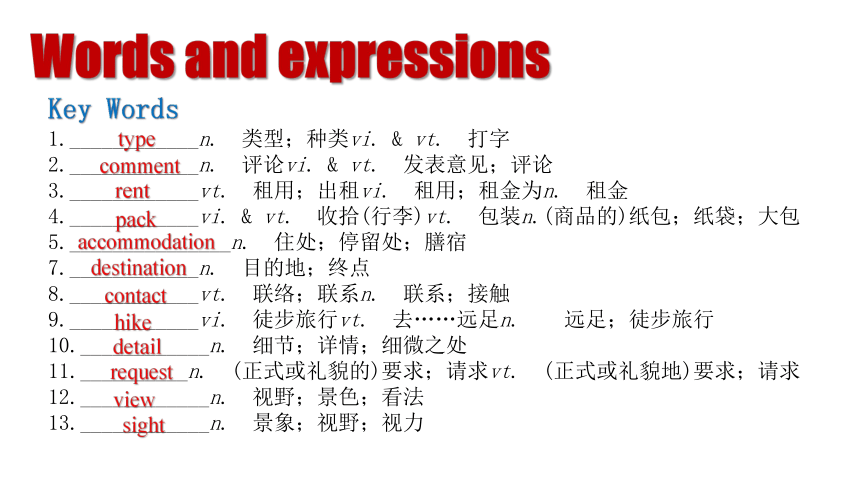
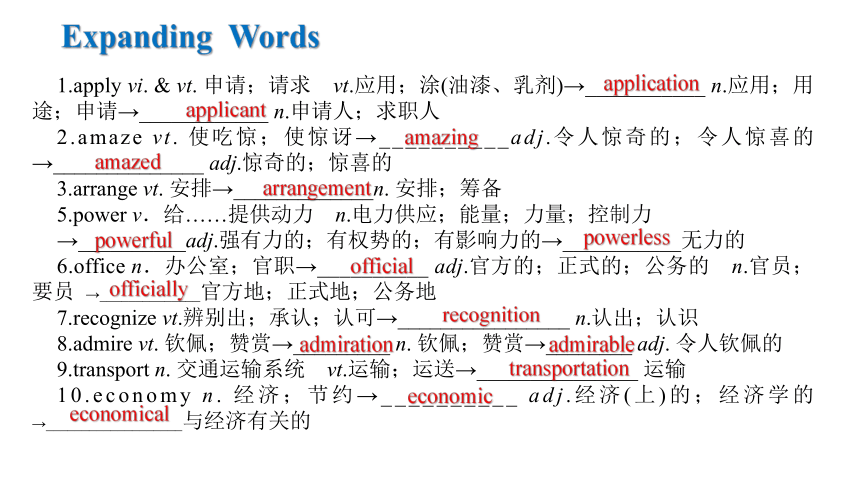
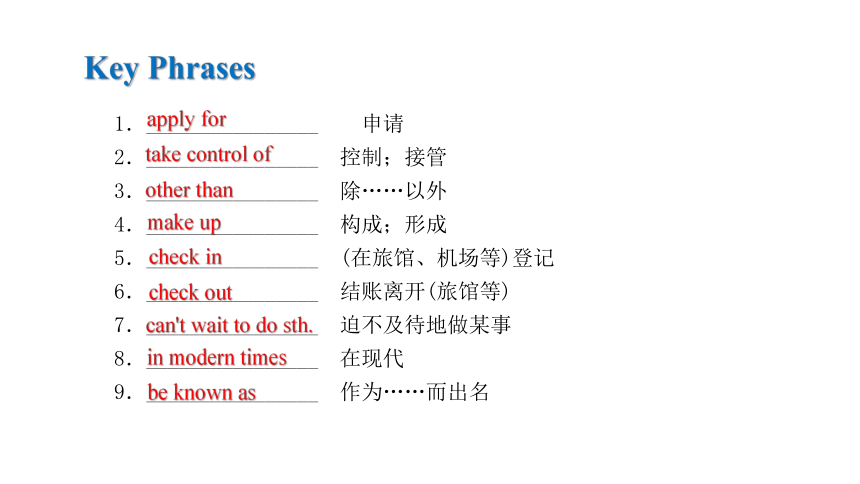
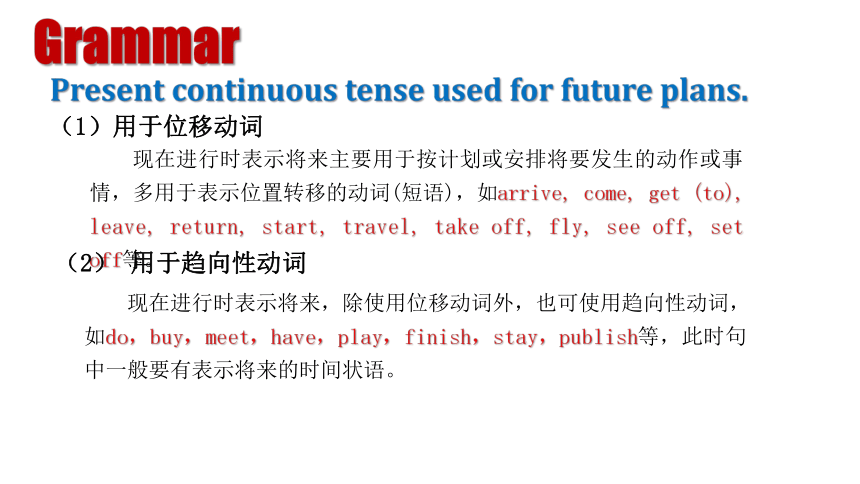
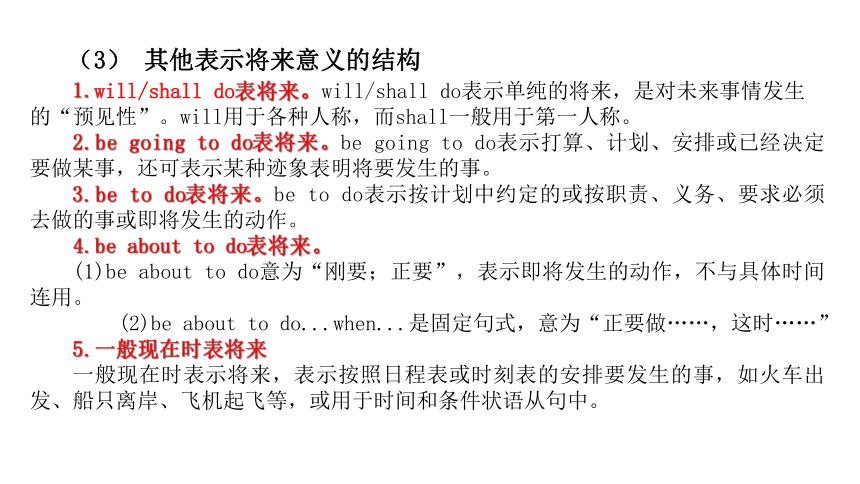
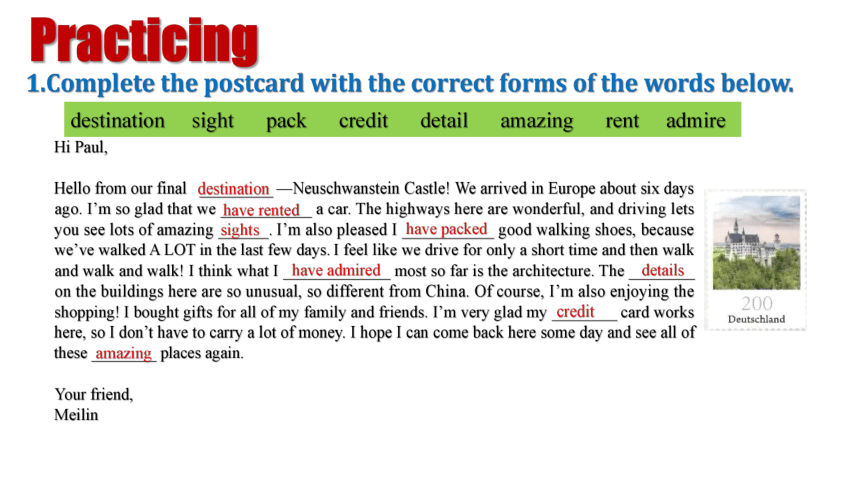
文档简介
(共15张PPT)
Assessing Your Progress
&
Video Time
Key Words
1.____________n. 类型;种类vi. & vt. 打字
2.____________n. 评论vi. & vt. 发表意见;评论
3.____________vt. 租用;出租vi. 租用;租金为n. 租金
4.____________vi. & vt. 收拾(行李)vt. 包装n.(商品的)纸包;纸袋;大包
5._______________n. 住处;停留处;膳宿
7.____________n. 目的地;终点
8.____________vt. 联络;联系n. 联系;接触
9.____________vi. 徒步旅行vt. 去……远足n. 远足;徒步旅行
10.____________n. 细节;详情;细微之处
11.__________n. (正式或礼貌的)要求;请求vt. (正式或礼貌地)要求;请求
12.____________n. 视野;景色;看法
13.____________n. 景象;视野;视力
Words and expressions
type
comment
rent
pack
accommodation
destination
contact
hike
detail
request
view
sight
1.apply vi. & vt. 申请;请求 vt.应用;涂(油漆、乳剂)→___________ n.应用;用途;申请→____________ n.申请人;求职人
2.amaze vt. 使吃惊;使惊讶→__________adj.令人惊奇的;令人惊喜的→______________ adj.惊奇的;惊喜的
3.arrange vt. 安排→_____________n. 安排;筹备
5.power v.给……提供动力 n.电力供应;能量;力量;控制力
→__________adj.强有力的;有权势的;有影响力的→___________无力的
6.office n.办公室;官职→__________ adj.官方的;正式的;公务的 n.官员;要员 →______________官方地;正式地;公务地
7.recognize vt.辨别出;承认;认可→________________ n.认出;认识
8.admire vt. 钦佩;赞赏→_________ n. 钦佩;赞赏→________ adj. 令人钦佩的
9.transport n. 交通运输系统 vt.运输;运送→_______________ 运输
10.economy n. 经济;节约→__________ adj.经济(上)的;经济学的→___________________与经济有关的
application
applicant
amazed
amazing
arrangement
powerful
powerless
official
officially
recognition
admiration
admirable
transportation
economic
economical
Expanding Words
1.________________ 申请
2.________________ 控制;接管
3.________________ 除……以外
4.________________ 构成;形成
5.________________ (在旅馆、机场等)登记
6.________________ 结账离开(旅馆等)
7.________________ 迫不及待地做某事
8.________________ 在现代
9.________________ 作为……而出名
apply for
take control of
other than
make up
check in
check out
can't wait to do sth.
in modern times
be known as
Key Phrases
Grammar
Present continuous tense used for future plans.
(1)用于位移动词
现在进行时表示将来主要用于按计划或安排将要发生的动作或事情,多用于表示位置转移的动词(短语),如arrive, come, get (to), leave, return, start, travel, take off, fly, see off, set off等。
(2) 用于趋向性动词
现在进行时表示将来,除使用位移动词外,也可使用趋向性动词,如do,buy,meet,have,play,finish,stay,publish等,此时句中一般要有表示将来的时间状语。
(3) 其他表示将来意义的结构
1.will/shall do表将来。will/shall do表示单纯的将来,是对未来事情发生的“预见性”。will用于各种人称,而shall一般用于第一人称。
2.be going to do表将来。be going to do表示打算、计划、安排或已经决定要做某事,还可表示某种迹象表明将要发生的事。
3.be to do表将来。be to do表示按计划中约定的或按职责、义务、要求必须去做的事或即将发生的动作。
4.be about to do表将来。
(1)be about to do意为“刚要;正要”,表示即将发生的动作,不与具体时间连用。
(2)be about to do...when...是固定句式,意为“正要做……,这时……”
5.一般现在时表将来
一般现在时表示将来,表示按照日程表或时刻表的安排要发生的事,如火车出发、船只离岸、飞机起飞等,或用于时间和条件状语从句中。
Practicing
1.Complete the postcard with the correct forms of the words below.
Hi Paul,
Hello from our final _________ —Neuschwanstein Castle! We arrived in Europe about six days ago. I’m so glad that we ___________ a car. The highways here are wonderful, and driving lets you see lots of amazing ______. I’m also pleased I ___________ good walking shoes, because we’ve walked A LOT in the last few days. I feel like we drive for only a short time and then walk and walk and walk! I think what I _____________ most so far is the architecture. The ________ on the buildings here are so unusual, so different from China. Of course, I’m also enjoying the shopping! I bought gifts for all of my family and friends. I’m very glad my ________ card works here, so I don’t have to carry a lot of money. I hope I can come back here some day and see all of these ________ places again.
Your friend,
Meilin
destination sight pack credit detail amazing rent admire
destination
have rented
sights
have packed
have admired
details
credit
amazing
Paul: Hey Meilin. This is Paul, calling from the Old Town of Lijiang!
Meilin: Hi Paul! You are already in Lijiang ! Great to hear you! So what do you think of the Old Town there
Paul: Oh, we love it. You know, it is so different from big cities.
Meilin: Really How long are you staying there
Paul: About four days, since my dad has to go back to work next Monday. We arrived yesterday and visited the Old Town. Tomorrow we’re going to Yulong Snow Mountain. In order to save time, we’re taking the cable car up there. If we still have time, we’re planning to see Blue Moon Valley and Yak Meadow.
Meilin: Sounds great! Oh, don’t forget it’s much colder on Snow Mountain. Be sure to keep warm!
Paul: Thanks! We’re bringing sweaters and coats with us, so I hope we’ll be OK. I’ll see you in a few days! Talk to you soon.
2.Read the conversation and mark the phrases expressing future plans,and then role-play the conversation with a partner. Pay attention to your stress and intonation.
Video Time
Machu Picchu is an ancient city high up in the Andes Mountains of Peru in South America. It is very popular with tourists and brings money into Peru.
alpaca
Machu Picchu
Complete the sentences with the words and phrases below.
magnetic centre Inca civilisation outside world stalls business and money ruins
1. Machu Picchu was once part of the _______________.
2. For many years Machu Picchu was lost to the _____________.
3. Machu Picchu is now made up of__________.
4. People believe that Machu Picchu is a(n) _____________, attracting many tourists each year.
5. Apart from being a magical place, Machu Picchu also bring a lot of
_________________ to Peru.
6. Local people sell things at ______ to tourists.
outside world
Inca civilisation
ruins
magnetic centre
business and money
stalls
Before you watch
Let’s watch the video Machu Picchu
1. Another name for Machu Picchu is ______.
A. Aguas Calientes B. one of the magnetic centres of the ancient world
C. the Lost City of the Inca
2. Machu Picchu was built ______.
A. in 1911 B. more than 500 years ago C. 500 years ago
3. Some people worry that too many tourists going to Machu Picchu ______.
A. will be bad for the environment B. will be bad for business C. will be too noisy
4. The people in the town live completely ______.
A. on the money from tourism B. by selling arts C. by driving buses
5. Machu Picchu may be changed forever by ______.
A. the weather B. poverty C. tourism
While you watch
C
B
A
A
C
Read the sentences and underline the key words in each sentence . Watch and choose the correct answers.
After you watch
1.Watch another video to mainly learn the history of Machu Picchu.
1.Are there any places like Machu Picchu in China In what ways are they alike
2 Should tourism be stopped in places like Machu Picchu Why or why not
Tourism should not be stopped in places like Machu Picchu. While such places need to be protected, this should be balanced by the need for the world to see and experience their wonders, and the need for local people to make a living.
There are a few places like Machu Picchu in China. For example, near Turpan, Xinjiang there is the ancient walled city of Gaochang. The city was destroyed by war in the 14th century, though some buildings and the city walls still remain. Since that time, no one has lived there. Gaochang is like Machu Picchu in that at one time it was a great city, but no one lives there any longer, and that it is in a fairly remote area.
2.Work in groups. Discuss the questions.
Homework
1.Let Ss discuss the advantages and disadvantages of developing tours.
2.Finish consolidation exercises about the whole unit.
Assessing Your Progress
&
Video Time
Key Words
1.____________n. 类型;种类vi. & vt. 打字
2.____________n. 评论vi. & vt. 发表意见;评论
3.____________vt. 租用;出租vi. 租用;租金为n. 租金
4.____________vi. & vt. 收拾(行李)vt. 包装n.(商品的)纸包;纸袋;大包
5._______________n. 住处;停留处;膳宿
7.____________n. 目的地;终点
8.____________vt. 联络;联系n. 联系;接触
9.____________vi. 徒步旅行vt. 去……远足n. 远足;徒步旅行
10.____________n. 细节;详情;细微之处
11.__________n. (正式或礼貌的)要求;请求vt. (正式或礼貌地)要求;请求
12.____________n. 视野;景色;看法
13.____________n. 景象;视野;视力
Words and expressions
type
comment
rent
pack
accommodation
destination
contact
hike
detail
request
view
sight
1.apply vi. & vt. 申请;请求 vt.应用;涂(油漆、乳剂)→___________ n.应用;用途;申请→____________ n.申请人;求职人
2.amaze vt. 使吃惊;使惊讶→__________adj.令人惊奇的;令人惊喜的→______________ adj.惊奇的;惊喜的
3.arrange vt. 安排→_____________n. 安排;筹备
5.power v.给……提供动力 n.电力供应;能量;力量;控制力
→__________adj.强有力的;有权势的;有影响力的→___________无力的
6.office n.办公室;官职→__________ adj.官方的;正式的;公务的 n.官员;要员 →______________官方地;正式地;公务地
7.recognize vt.辨别出;承认;认可→________________ n.认出;认识
8.admire vt. 钦佩;赞赏→_________ n. 钦佩;赞赏→________ adj. 令人钦佩的
9.transport n. 交通运输系统 vt.运输;运送→_______________ 运输
10.economy n. 经济;节约→__________ adj.经济(上)的;经济学的→___________________与经济有关的
application
applicant
amazed
amazing
arrangement
powerful
powerless
official
officially
recognition
admiration
admirable
transportation
economic
economical
Expanding Words
1.________________ 申请
2.________________ 控制;接管
3.________________ 除……以外
4.________________ 构成;形成
5.________________ (在旅馆、机场等)登记
6.________________ 结账离开(旅馆等)
7.________________ 迫不及待地做某事
8.________________ 在现代
9.________________ 作为……而出名
apply for
take control of
other than
make up
check in
check out
can't wait to do sth.
in modern times
be known as
Key Phrases
Grammar
Present continuous tense used for future plans.
(1)用于位移动词
现在进行时表示将来主要用于按计划或安排将要发生的动作或事情,多用于表示位置转移的动词(短语),如arrive, come, get (to), leave, return, start, travel, take off, fly, see off, set off等。
(2) 用于趋向性动词
现在进行时表示将来,除使用位移动词外,也可使用趋向性动词,如do,buy,meet,have,play,finish,stay,publish等,此时句中一般要有表示将来的时间状语。
(3) 其他表示将来意义的结构
1.will/shall do表将来。will/shall do表示单纯的将来,是对未来事情发生的“预见性”。will用于各种人称,而shall一般用于第一人称。
2.be going to do表将来。be going to do表示打算、计划、安排或已经决定要做某事,还可表示某种迹象表明将要发生的事。
3.be to do表将来。be to do表示按计划中约定的或按职责、义务、要求必须去做的事或即将发生的动作。
4.be about to do表将来。
(1)be about to do意为“刚要;正要”,表示即将发生的动作,不与具体时间连用。
(2)be about to do...when...是固定句式,意为“正要做……,这时……”
5.一般现在时表将来
一般现在时表示将来,表示按照日程表或时刻表的安排要发生的事,如火车出发、船只离岸、飞机起飞等,或用于时间和条件状语从句中。
Practicing
1.Complete the postcard with the correct forms of the words below.
Hi Paul,
Hello from our final _________ —Neuschwanstein Castle! We arrived in Europe about six days ago. I’m so glad that we ___________ a car. The highways here are wonderful, and driving lets you see lots of amazing ______. I’m also pleased I ___________ good walking shoes, because we’ve walked A LOT in the last few days. I feel like we drive for only a short time and then walk and walk and walk! I think what I _____________ most so far is the architecture. The ________ on the buildings here are so unusual, so different from China. Of course, I’m also enjoying the shopping! I bought gifts for all of my family and friends. I’m very glad my ________ card works here, so I don’t have to carry a lot of money. I hope I can come back here some day and see all of these ________ places again.
Your friend,
Meilin
destination sight pack credit detail amazing rent admire
destination
have rented
sights
have packed
have admired
details
credit
amazing
Paul: Hey Meilin. This is Paul, calling from the Old Town of Lijiang!
Meilin: Hi Paul! You are already in Lijiang ! Great to hear you! So what do you think of the Old Town there
Paul: Oh, we love it. You know, it is so different from big cities.
Meilin: Really How long are you staying there
Paul: About four days, since my dad has to go back to work next Monday. We arrived yesterday and visited the Old Town. Tomorrow we’re going to Yulong Snow Mountain. In order to save time, we’re taking the cable car up there. If we still have time, we’re planning to see Blue Moon Valley and Yak Meadow.
Meilin: Sounds great! Oh, don’t forget it’s much colder on Snow Mountain. Be sure to keep warm!
Paul: Thanks! We’re bringing sweaters and coats with us, so I hope we’ll be OK. I’ll see you in a few days! Talk to you soon.
2.Read the conversation and mark the phrases expressing future plans,and then role-play the conversation with a partner. Pay attention to your stress and intonation.
Video Time
Machu Picchu is an ancient city high up in the Andes Mountains of Peru in South America. It is very popular with tourists and brings money into Peru.
alpaca
Machu Picchu
Complete the sentences with the words and phrases below.
magnetic centre Inca civilisation outside world stalls business and money ruins
1. Machu Picchu was once part of the _______________.
2. For many years Machu Picchu was lost to the _____________.
3. Machu Picchu is now made up of__________.
4. People believe that Machu Picchu is a(n) _____________, attracting many tourists each year.
5. Apart from being a magical place, Machu Picchu also bring a lot of
_________________ to Peru.
6. Local people sell things at ______ to tourists.
outside world
Inca civilisation
ruins
magnetic centre
business and money
stalls
Before you watch
Let’s watch the video Machu Picchu
1. Another name for Machu Picchu is ______.
A. Aguas Calientes B. one of the magnetic centres of the ancient world
C. the Lost City of the Inca
2. Machu Picchu was built ______.
A. in 1911 B. more than 500 years ago C. 500 years ago
3. Some people worry that too many tourists going to Machu Picchu ______.
A. will be bad for the environment B. will be bad for business C. will be too noisy
4. The people in the town live completely ______.
A. on the money from tourism B. by selling arts C. by driving buses
5. Machu Picchu may be changed forever by ______.
A. the weather B. poverty C. tourism
While you watch
C
B
A
A
C
Read the sentences and underline the key words in each sentence . Watch and choose the correct answers.
After you watch
1.Watch another video to mainly learn the history of Machu Picchu.
1.Are there any places like Machu Picchu in China In what ways are they alike
2 Should tourism be stopped in places like Machu Picchu Why or why not
Tourism should not be stopped in places like Machu Picchu. While such places need to be protected, this should be balanced by the need for the world to see and experience their wonders, and the need for local people to make a living.
There are a few places like Machu Picchu in China. For example, near Turpan, Xinjiang there is the ancient walled city of Gaochang. The city was destroyed by war in the 14th century, though some buildings and the city walls still remain. Since that time, no one has lived there. Gaochang is like Machu Picchu in that at one time it was a great city, but no one lives there any longer, and that it is in a fairly remote area.
2.Work in groups. Discuss the questions.
Homework
1.Let Ss discuss the advantages and disadvantages of developing tours.
2.Finish consolidation exercises about the whole unit.
